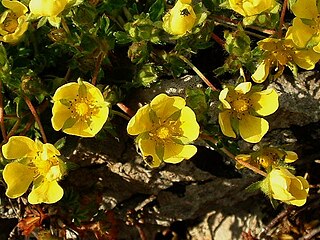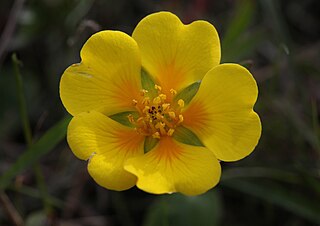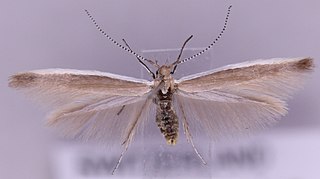
The rose subfamily Rosoideae consists of more than 850 species, including many shrubs, perennial herbs, and fruit plants such as strawberries and brambles. Only a few are annual herbs.

Potentilla is a genus containing over 500 species of annual, biennial and perennial herbaceous flowering plants in the rose family, Rosaceae.

Potentilla erecta is a herbaceous perennial plant belonging to the rose family (Rosaceae).

Potentilla indica, known commonly as mock strawberry, Indian-strawberry, or snakeberry in North America, is a flowering plant in the family Rosaceae. It has ternate foliage and an aggregate accessory fruit, similar to the true strawberries of the Fragaria genus. Unlike the white or slightly pink flowers of true strawberries, Potentilla indica has yellow flowers, as do many other Potentilla species. It is native to eastern and southern Asia, but has naturalized in many regions worldwide.

Potentilla pusilla, the spring cinquefoil or spotted cinquefoil, is a perennial species of flowering plant in the rose family (Rosaceae). It may grow up to the height of 5–15 cm.

Oberthür's grizzled skipper is a species of skipper.

Potentilla hickmanii is an endangered perennial herb of the rose family. This rare plant species is found in a narrowly restricted range in two locations in coastal northern California, in Monterey County, and in very small colonies in San Mateo County. This small wildflower, endemic to western slopes of the outer coastal range along the Pacific Ocean coast, produces bright yellow blossoms through spring and summer.

Potentilla gracilis, known as slender cinquefoil or graceful cinquefoil, is a species of cinquefoil. It ranges from Alaska down the west coast of Canada and the United States, and Colorado.

Potentilla crantzii, the alpine cinquefoil, is a flowering plant in the family Rosaceae. It is native to North America.

Purple moor grass and rush pastures is a type of Biodiversity Action Plan habitat in the UK. It occurs on poorly drained neutral and acidic soils of the lowlands and upland fringe. It is found in the South West of England, especially in Devon.

Potentilla recta, the sulphur cinquefoil or rough-fruited cinquefoil, is a species of cinquefoil. It is native to Eurasia but it is present in North America as an introduced species, ranging through almost the entire continent except the northernmost part of Canada and Alaska.

Drymocallis is a genus of plants formerly included with the typical cinquefoils (Potentilla). It contains three species known or suspected to be protocarnivorous, but more cinquefoils might eventually be moved here:
Stigmella tormentillella is a moth of the family Nepticulidae. It is found from Germany to the Pyrenees and Italy, and from France to Romania.

Potentilla diversifolia or Potentilla × diversifolia is a species of flowering plant in the Rose Family (Rosaceae) known by the common names varileaf cinquefoil, different-leaved cinquefoil, and mountain meadow cinquefoil.

Potentilla norvegica is a species of cinquefoil known by the common names rough cinquefoil, ternate-leaved cinquefoil, and Norwegian cinquefoil. It is native to Europe, Asia, and parts of North America, and it can be found elsewhere as an introduced species.

Coleophora albicostella is a moth of the family Coleophoridae. It is found from Latvia to the Iberian Peninsula, Italy, Greece and Cyprus.

Wellington College Bog is a 6.2-hectare (15-acre) biological Site of Special Scientific Interest in the grounds of Wellington College on the northern outskirts of Sandhurst in Berkshire.

Potentilleae is a tribe of the rose family, Rosaceae.

















